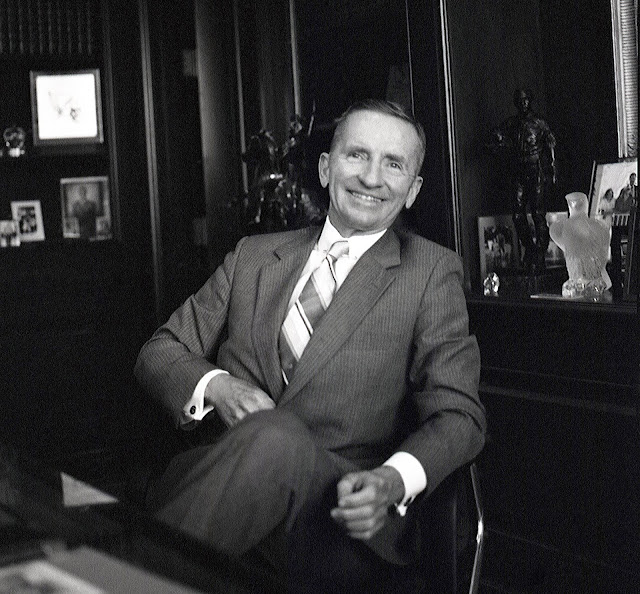Joseph Louis Searles III: The First African American Member of the New York Stock Exchange
“The New York Stock Exchange is not a cold, heartless
organization. It isn’t eighths and quarters on decimal points—it’s people.”
-
Robert Lester Newburger
Born in Germany, Morris Newburger (1834-1917) immigrated to
the United States in 1854. His father was a teacher and descended from a family
of rabbis. In Germany, Morris worked in the dry goods business. In the United
States, he lived in New York, in the South, in Cedar Rapids, Iowa, and Rock
Island, Illinois, before settling in Philadelphia in 1963. In 1862, he married
the former Betty Hochstadter, and he entered into a partnership with his
brothers-in-law, Adolph, Albert, and David Hochstadter, creating the firm of
Newburger & Hochstadter, wholesale clothing traders. Morris became the
president of the Mechanics National Bank in Philadelphia and founded the
clothing manufacturer, Morris Newburger & Sons with his sons. He and his
wife had seven children: five sons, Samuel M. Newburger, Alfred H. Newburger,
Frank. L. Newburger, Morton M. Newburger, and Lester M. Newburger, and two
daughters, Ida Newburger Gutman and Carrie Newburger Loeb.
Before it went out of business, Newburger, Loeb & Co.
(an affiliated firm) became known for Joseph Louis Searles III (b. 1940), who
became a partner and the first African American member of the New York Stock
Exchange when he was proposed as a member by the firm. (At the time, the NYSE
only had one African American allied member, Clarence B. Jones, who was a
member of Cogan, Berlind, Weill & Levitt, Inc.) A native of Ford Hood, TX,
Searles III was a graduate of Kansas State University (1963) where he was a
football star. He played for the New York Giants and then worked as an aide for
New York Mayor John Lindsay in 1967. Robert L. Newburger said that “his firm
wasn’t attempting to make a racial breakthrough on the 178-year-old exchange.
‘This is strictly an economic thing,’ he declared, praising Searles for
intelligence and sincerity.” Searles said, “I have experienced no feeling of
rejection since I applied for membership…I think the business community at
large has realized that the time would come when these breakthroughs would be
initiated and would be ready to accept it.” Searles told the press “he was
proud of the opportunity to ‘penetrate a bastion of the white financial
structure.’” He was asked if he was a supporter of the Black Panthers to which
he said, “I’m doing my own thing.” “Black Man Seeks Seat on Stock Exchange,”
The Central New Jersey Home News (New Brunswick, NJ), Jan. 31, 1970, 15;
Chermelle D. Edwards, “How Joseph L. Searles III Impacted Urban Finance in
America,” Atlanta Black Star, July 12, 2015; Vartanig G. Vartain, “Negro
Proposed for a Seat on Exchange,” NYT, Jan. 31, 1970; “Big Board Membership is
Sought by a Negro, First for the Exchange,” Wall Street Journal, Jan. 30, 1970,
7.
At the time, “Searles said of his proposed membership: ‘It’s
a personal challenge to me as a black man to become part of the economic
mainstream of this country… I don’t believe I’ll become a token black. I think
there will be more black members at the exchange. Hopefully, my presence will
increase the credibility of the financial community, as far as blacks are
concerned.” Vartanig G. Vartan, “K-State grad to be first black in stock
exchange,” The Salina Journal (Salina, KS), Feb. 1, 1970, 8; “Approval by Big
Board,” NYT, Feb. 13, 1970.
Searles III was only a member of the NYSE for about eight
months before he resigned when the firm ran into trouble and sold his seat. He
then went into business for himself. According to The New York Times, “Searles
said that at times he detected some ‘builtin (sic) prejudices against blacks,
since 90 per cent of the members have no social contacts with black.’ But the
big diving line, he came to feel, was not skin color but money.” Searles III
went on to work with Manufacturers Hanover Trust Co. In 1971, Daniels &
Bell, Inc. became the first black-owned member firm of the New York Stock
Exchange. It was founded by Travers Bell and Willie E. Daniels. It closed in
1994. “Negro of NYSE for Year Chalks it Up: Experience,” The Fresno Bee The
Republican (Fresno, CA), March 28, 1971, 19. See also “Playboy Bunny Gal Begins
New Career,” The News-Palladium (Benton Harbor, MI), August 20, 1969, 29; Firm
Announcement, The Los Angeles Times, March 2, 1971, 55; Chermelle D. Edwards,
“How Joseph L. Searles III Impacted Urban Finance in America,” Atlanta Black
Star, July 12, 2015.
Searles reflected on his experience with the Wall Street Journal:
Searles reflected on his experience with the Wall Street Journal:




Comments
Post a Comment